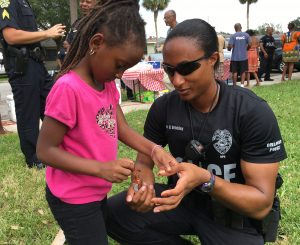Few careers offer more opportunities for self-fulfillment than service as a law enforcement officer.

Sworn officers play a vital role in maintaining safety and welfare at all levels of government and across the country, but law enforcement is a service career at its core. Policing is as much about helping people and maintaining community quality of life as it is about enforcing laws. Those who are looking for a career filled with the type of daily edge-of-your-seat excitement depicted on television will be disappointed. While the dangers of the job are real, and you will be expertly trained to respond to any situation, the heart of policing lies in daily interactions with citizens.
Today, many law enforcement agencies subscribe to the community policing model, which views community engagement, rather than response to specific crimes or incidents, as the core of police work. Many of the issues officers face are community problems in need of a solution often best achieved outside the criminal justice system. By hearing and understanding the causes of community concern, dedicated peace officers find workable, sustainable, and cost effective resolutions to issues as minor as a noise disturbance or as complex as a mass protest or demonstration. Law enforcement officers are the only community servants in continual touch with the communities they serve. This requires officers who are adept at fostering relationships and building connections between people and groups. Today’s officers should come prepared to think and solve problems with a broad community focus.
Law enforcement officers must tend to quality of life issues in their communities. Officers should be connected with the community in a way that facilitates their ability to collect, analyze, and share critical information and resources.
Policing is a job that will bring out the best in you and make you more than you are right now. It is a job with serious responsibilities, but the reward is having a job that really counts. Policing will ask a lot of you, but it will give you so much in return including:
- Knowing that your presence conveys peace of mind,
- Having a sense of accomplishment at the end of the day,
- Serving as a community role model,
- Being a first-responder to a person in crisis,
- And much, much more.
In addition to providing a sense of fulfillment and purpose, law enforcement is a career environment that offers varying experiences and differing personnel perspectives. With more than 17,000 state and local law enforcement agencies, there is plenty of variety in location, type of agency, and specialization. After an average of two years in uniformed patrol, officers may have the opportunity to branch off into specialization areas based on their interests and ambitions. These special assignments vary by agency but typically include investigations; alternative patrol (e.g., bicycle, mounted); and traffic enforcement, just to name a few. Furthermore, for those who desire a leadership role, the opportunities for advancement are great.
| Type of agency | Number of agencies | Number of full-time sworn officers |
| All State and local | 17,985 | 731,903 |
| Local police | 12,501 | 446,974 |
| Sheriff | 3,063 | 175,018 |
| Primary State | 50 | 58,190 |
| Special jurisdiction | 1,733 | 49,398 |
| Constable/Marshal | 638 | 2,323 |
| Note: Special jurisdiction category includes both state-level and local-level agencies. Consolidated police-sheriffs are included under local police category. Agency counts exclude those operating on a part-time basis. SOURCE: U.S. Department of Justice, Bureau of Justice Statistics, Census of State and Local Law Enforcement Agencies, 2008 |
||
Your job as a law enforcement officer puts you in a very important and responsible position. Law enforcement agencies are the only social service agency deployed every day of the year and around the clock. While in uniform, you are the embodiment and face of your community. You will protect citizens from those who wish to do them harm. While the responsibility is great, the rewards are unrivaled.
